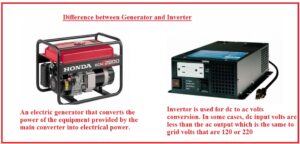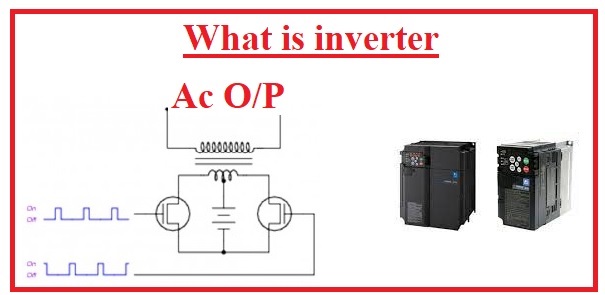 Hello, readers welcome to the new post. We will learn Difference between Generator and Inverter. The generator is an electrical device used for power generation while the inverter is used to convert one type of current to other. There are two main types of current. The inverter is used in circuits where dc power is needed such as vehicles.
Hello, readers welcome to the new post. We will learn Difference between Generator and Inverter. The generator is an electrical device used for power generation while the inverter is used to convert one type of current to other. There are two main types of current. The inverter is used in circuits where dc power is needed such as vehicles.
These two machines come with different structures and features so we will find their basic differences. SO let’s get started Difference between Generator and an Inverter.
Difference between Generator and Inverter
What is INverter
- Invertor is used for dc to ac volts conversion. In some cases, dc input volts are less than the ac output which is the same to grid volts that are 120 or 220
- It is used as a standalone device for solar power and used as a backup to a charger battery.
- It also used in larger size projects and in UPS
- Different types of inverters are used on the basis of structure.
- Inverter gets dc and converts it into ac for this gets the input and sends to different switches and filters used for making clear wave
- Currently, power inverters are very commonly used. Different inverters used different techniques for gave filtration.
- The inverter used 12dc to 120 volts ac conversion
- It restores power very fastly if power gets off
- There is no sound produced using its working
- It’s working based on the battery
- They are available in lower capacity ranges
- It no needed any fuel like a generator
- Very less maintenance is needed for it
- They are less weight and available in thousand to four thousand-watt capacity
- It is more expensive than the generator
What is Generator
- An electric generator that converts the power of the equipment provided by the main converter into electrical power. The prime mover can be smoke, water, gas turbine, wind turbine, etc.
- The first electric generator was invented by Faraday in 1831, a former scientist in the United Kingdom. The name of the Faraday generator was Faraday Disk. This generator would bring power to the grid station.
- With the invention of the generator, Faraday reopened its operating system in 1831 its rule also known as Faraday law.
- Faraday’s law states that if an operating object is placed in a magnetic field then the emf will be drawn from that object.
- Emf=dø/dt

The construction of the Faraday disk generator was very simple because he used a simple copper disk and rotated in a field of horseshoe shape magnet. The faraday generator output was dc voltage.
Both engines and generators have almost the same design that some can drive as generators.
The dc or ac generator plays the most important rules from our production system to the industries and our homes that supply power to our electrical and mechanical equipment.
- The generator generates the one twenty volts with a frequency of sixty hertz
- Need some time to start for operation
- It makes noise and smoke
- It used different sources such as oil, gas petrol for the operation
- Their capacity is larger than the inverter
- It does not need any backup like an inverter
- It needed regular Maintenence for proper working
- They are less expensive than the inverter
That is all about the Difference between Generator and Inverter all details has been explained. If you have any further query ask in comments. Thanks for reading have a nice day.







